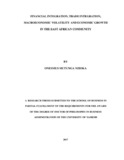| dc.description.abstract | This study sought to investigate the influence of macroeconomic volatility and trade
integration on the relationship between financial integration and economic growth in the
EAC member states. Specifically, the study aimed at determining the: relationship
between financial integration and economic growth in the EAC; moderating effect of
macro-economic volatility on the relationship between financial integration and
economic growth in the EAC; intervening effect of trade integration on the relationship
between financial integration and economic growth in the EAC and finally, the joint
effect of financial integration, trade integration, macro-economic volatility on economic
growth in the EAC. To achieve these specific objectives, four hypotheses were
developed, including: There is no significant effect of Financial integration on economic
growth; there is no significant moderating effect of macro-economic volatility on the
relationship between financial integration and economic growth; there is no significant
intervening effect of trade integration on the relationship between financial integration
and economic growth; and lastly, there is no significant joint effect of financial
integration, macroeconomic volatility and trade integration on economic growth. The
study adopted a positivistic research philosophy and casual research design. Diagnostic
tests were carried out to meet the requirements for conducting correlation and regression
analysis on panel data. These include; Multicollinearity tests, Im- Pesaran-Shit Test (IPS)
panel unit root test and Hausman test for fixed effects and random effects models.
Descriptive statistics such as the mean, standard deviation, coefficient of variation as well
as correlation analysis were conducted as the preliminary statistical analysis.
Generalized-two stage least squares instrumental variable regression model (G2SLSIV)
was then conducted to test the hypotheses. The findings of the study showed that: macro-
economic volatility does not have a significant moderating effect on the relationship
between financial integration and economic growth; there is no significant intervening
effect of trade integration on the relationship between financial integration and economic
growth. Overall, financial integration, macroeconomic volatility and trade integration do
not have a joint effect on economic growth. These findings contribute to knowledge in
the sense that, the positive and significant correlation between financial integration and
economic growth confirms that, an increase in gross capital flows is accompanied by
increase in economic growth. It also contributes to knowledge by revealing that, financial
deepening contributes positively to financial integration which further contributes to
accelerating economic growth. Therefore, the study is useful to the governments of
respective member states in formulating policies aimed at achieving macro-economic
stability, similarity in economic structures and ensuring the quality of institutions. The
study culminates with acknowledging the limitations encountered and provides
suggestions for further research. | |



